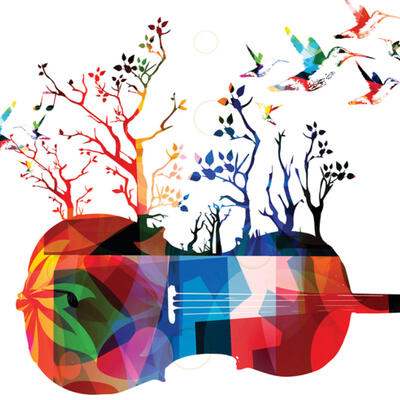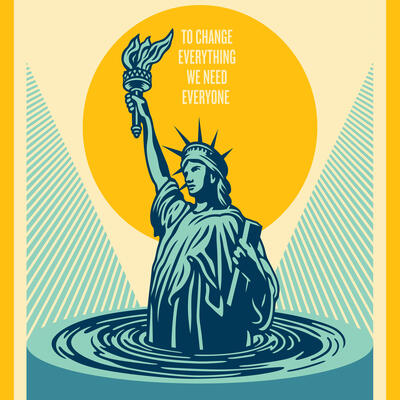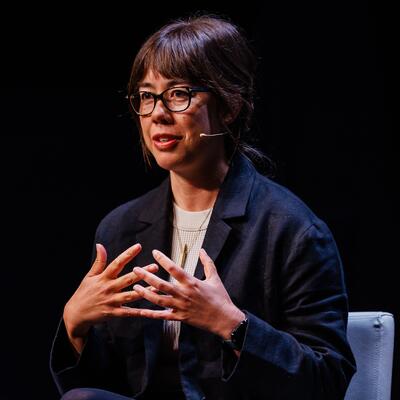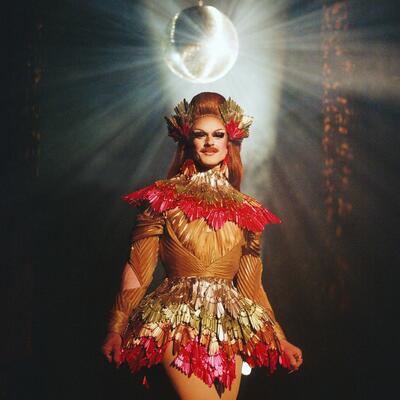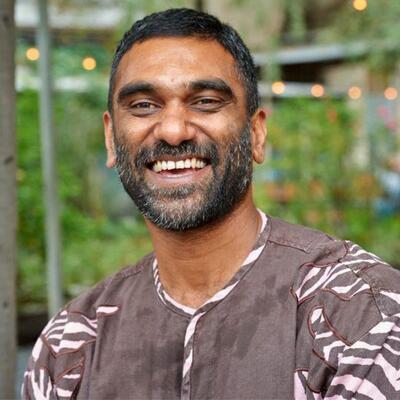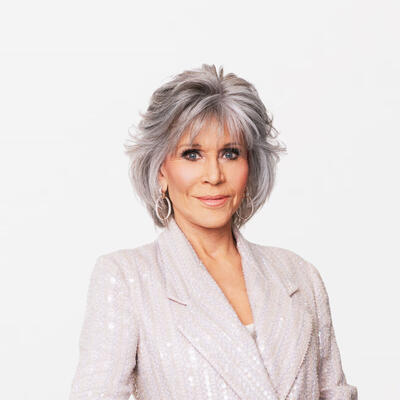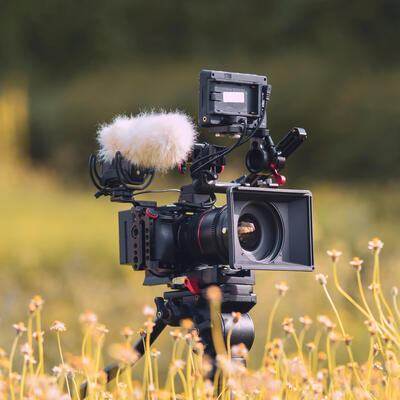
Climate Policy Wonk Turned Indie Pop Star: AJR’s Adam Met
Guests
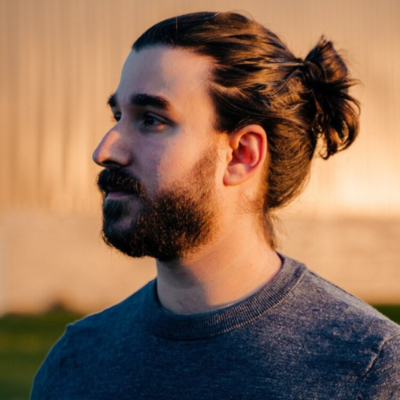
Adam Met
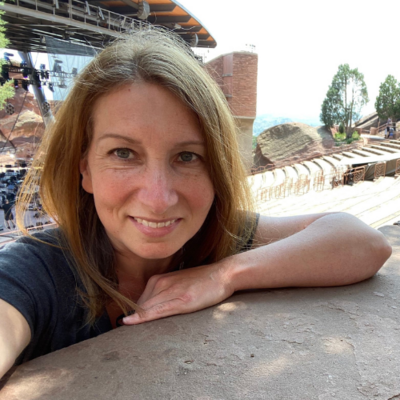
Lara Seaver
Summary
Adam Met is a behind-the-scenes climate policy powerhouse. He also happens to be the bass player in the award winning indie pop group AJR with his brothers, Jack and Ryan. At the same time the band was gaining popularity, Adam was working on getting degrees and eventually a PhD in Human Rights Law and Sustainable Development.
Met can trace his passion for climate to one moment in high school, when he was on a field trip with his human rights class to see Mary Robinson, President of Ireland and former UN High Commissioner for Human Rights. “Sitting in that audience hearing her speak when I was 17 really started to make the connection for me between how people and the planet interacted,” says Met. “I continued to study that throughout my undergrad and graduate education. But I can keep pointing back to that moment.”
“I feel like we're the industry's best kept secret,” says Met when referring to his rock band of brothers, AJR. That’s despite the band winning awards, having songs high on the charts, and going viral on TikTok. While most people probably see a career in music and a career in climate policy as separate and distinct, Met says the engagement strategies are the same, “When you're writing music, producing music, putting together the marketing campaign, rolling out an album, going on a tour, developing merchandise, this campaign really is about engaging fans in something and bringing people together with a common mission. That really is the exact same thing that you're doing when building a campaign within any sort of movement.”
Met also uses the listening skills he developed as a musician in his climate policy work. During negotiations for what would become the landmark climate bill The Inflation Reduction Act, Met had specific policy goals in mind, but he says, “80 to 90 percent of the time, it really was a listening exercise for me. And I spent just as much time in Republican offices as I did in Democrat offices.”
Met then founded Planet Reimagined, which he describes not as a think tank, but as a thought and action tank. “Planet Reimagined innovated this idea of action research. It's doing research with an eye towards: how can we turn it into something real?” Met says.
Met and Planet Reimagined used what they learned from the listening done during IRA negotiations to come up with a plan to deploy renewable energy faster and farther. Met says, “We found huge overlap to site renewable energy on top of current oil and gas leases. This is land that has never been explored before for renewables. It's land that's previously been disturbed, which, if we can reuse that for renewables, would be huge.” They identified 23 million acres where these projects could go. The plan has the support of both Republican Congressman John Curtis and Democratic Congressman Mike Levin.
When Adam Met isn’t working to deploy renewable energy, he’s also working with organizations like the nonprofit Reverb to help lessen the carbon impact of live events and touring. Lara Seaver, Director of Projects at Reverb, says some of that work includes, “ Looking at better battery technology, solar power technology for live music. It's looking at better fuel for our trucks and buses and flights.” Seaver also helped the Lumineers go above and beyond in working to address their carbon pollution, and organized Billie Eilish’s solar-powered set at Lollapalooza.
Episode Highlights
2:50 - Adam Met on the moment that got him involved in climate
4:55 - Adam Met on his education and the beginning of AJR
8:49 - Adam Met on how his musical abilities aided his climate policy work
13:22 - Adam Met on starting Planet Reimagined
16:16 - Adam Met on his bipartisan plan for deploying more renewable energy
27:11 - Adam Met on the climate considerations of creating an album
30:34 - Adam Met on reducing the carbon impact of touring
34:27 - Lara Seaver on the surprising cause of most emission from live events
38:08 - Lara Seaver on the Lumineers’ ambitious climate conscious tour
39:25 - Lara Seaver on Reverb’s Music Decarbonization Project
41:54 - Lara Seaver on helping to organize Billie Ellish’s music and climate summit
Resources From This Episode (4)
Full Transcript
Note: Transcripts are generated using a combination of automated software and human transcribers and may contain errors. Please check the actual audio before quoting it.
Ariana Brocious: I’m Ariana Brocious and this is Climate One.
(music change)
Ariana Brocious: Greg Dalton is away. And joining me in his place this week is Climate One Producer Austin Colón. Hey Austin.
Austin Colón: Hey Ariana. Good to be here.
Ariana Brocious: Now, our audience can’t see this, but I’m looking at you over Zoom. And I can see behind you, what is that, four guitars?
Austin Colón: Five, actually.
Ariana Brocious: Right. Five. And you can actually play them! So you’re a producer on this show, our audio engineer, and a musician. And that has something to do with our main guest today.
Austin Colón: It does indeed. That main guest is Adam Met. He’s probably most famous for being the bass player in the indie pop band AJR.
Ariana Brocious: I’ll be honest, I hadn’t heard of AJR before we started working on this episode. But they’re huge! Their music has been on the Hot 100 top ten and they won a Billboard Music Award for best rock song, which by the way was a double Platinum single.
Austin Colón: I actually didn’t know them by name either. But I did recognize their music from my time spent on TikTok. Maybe I spend too much time there. Here’s a clip from double platinum their song Bang!
[Playback]
Ariana Brocious: Oh yeah! That sounds familiar! So is that how you found out about Adam Met - from music on TikTok?
Austin Colón: I wish I could say it was, since that would make me look way more hip . No, I actually discovered Adam Met after reading a piece he wrote for Time magazine called: What I Learned While Trying to Negotiate a Bipartisan Climate Policy in a Divided D.C. Turns out, when he’s not playing bass with his brothers in AJR, he’s using his PhD in Human RIghts Law and Sustainable Development to help negotiate climate policy.
Ariana Brocious: So bass player in a rock band, also climate policy negotiator. I can see why he caught your attention.
Austin Colón: Right! That hit pretty close to home for me, I once entertained the idea of being a recording and touring artist myself. that was the dream. I even went to college for music, But along the way I found myself being drawn to climate policy and politics.
Ariana Brocious: And here you find someone who went to school to help craft climate policy and THEN became a successful musician.
Austin Colón: Exactly. Though to be clear, Adam Met is somehow able to do both at once. He joined me for a conversation and told me how a school field trip set him on his current path.
Adam Met: So my high school offered a human rights course, which was a really rare thing for a high school to offer. Um, and I went to a public school in New York City, and so it was even more rare that they offered a human rights course. But during that Semester during the final semester of that course, we took a field trip to go see Mary Robinson speak and Mary Robinson was formerly the UN High Commissioner for Human Rights. She was the president of Ireland and really just a big advocate for the connection between human rights and climate and sitting in that audience hearing her speak when I was 17 really started to make the connection for me between how people and the planet interacted. So from there, I continued to study that throughout my undergrad and graduate educations. But I can keep pointing back to that moment. And Mary and I have met a handful of times over the course of the year since then. And she was on a podcast that I did about this very topic. And she is just a delightful person. In addition to being brilliant, So brilliant that I cited her, I think, over a dozen times in my PhD dissertation.
Austin Colón: wow. Okay. Do you remember something specific she said that really made it such a memorable event?
Adam Met: It was the first time that somebody made the connection between how humans were impacted by climate and humans impact the climate. So, again, I was 17 at the time. Climate change was not something that was coming from coming out of everybody's mouths and to hear that kind of dual role that humanity plays in climate. I don't remember the exact quote, but it was something having to do with humanity sitting in the middle of being kind of the instigator of climate change and feeling all of the impacts of climate change. So, um, That kind of really struck me.
Austin Colón: Yeah. I could definitely see how that would make an impact. Uh, and I went to high school in rural Pennsylvania, did not have a human rights class offered, barely had a civics class. Yeah. Um, And so now you have a PhD in International Human Rights Law and Sustainable Development and you have a Master's in Constitutional Religious Law. So of course, uh, that naturally led to you forming a band with your brothers and becoming a rock star, right?
Adam Met: Yeah, you can see that path, right? There's a direct line between the two.
Austin Colón: Yeah, so how did you end up in this famous band?
Adam Met: I wouldn't call us a famous band. I feel like we're the industry's best kept secret because so many people know some of the songs, but they're like, Oh, this song is by AJR. This song's by AJR. So it's, it's funny because we're in that weird moment right now, but I kind of have a. strange brain that requires me to do stuff on the left side of my brain and the right side of my brain at the same time.
And even though to kind of most of the world these two things that I'm doing are really distinct, I don't see them as distinct as probably the rest of the world does. So just kind of at the most basic level, if you think about an album campaign, When you're writing music, producing music, putting together the marketing campaign, rolling out an album, going on a tour, developing merchandise, this campaign really is about engaging fans in something and bringing people together with a common mission. That really is the exact same thing that you're doing when building a campaign within any sort of movement, and the movement that I participate most in is the climate movement. So, All of the strategies that I've learned from music and all of the strategies that I've learned from climate kind of make their way across both. And I'll give you one or two examples.
Austin Colón: hmm.
Adam Met: When we think about audiences, one of, one of the things that, um, I spent, so I teach a course on climate campaigning at Columbia. And one of the things that I kind of drive into my students over and over again is about how to think about. Your audience, how to really clearly define your audience for your campaign, how to create subsets of the audience, how different elements of the campaign might attract different audiences, how to speak to them differently. That is exactly the same kind of thing that happens in music. They're the kind of fans that are the casual fans who support what you're doing, but are only ever going to listen to the music on Spotify. They're not going to come to a show, they're not going to buy merchandise, they're not going to create their own UGC user generated content about the music. They're really the kind of casual fans. Then, as you climb up this, you know, proverbial ladder of engagement, you get to all of these other types of fans, people who will come to shows, will buy merch, will organize around the band in order to try and get more people engaged. Now that's exactly the same way an organization or a campaign or a movement works, right? Especially one that's focused around advocacy. You want to try and grow that community. for lack of a better word. You wanna try and get people more engaged, but there are going to be all of these different levels. So that's a very long winded way of saying, there are two very different things, but there's so much overlap between the two that it made sense for me to be doing both at the same time.
Austin Colón: Yeah, I mean, that's, yeah, when you put it that way, that does make sense. Uh, it's funny. I feel like we're kind of doing or have the, the opposite life journey. I went to college for music. Actually, I went to the Berkeley college of music and, um, I learned there that, you know, being a good musician is so much more than just being a technically good player. It's all about how good a listener you are. Yeah. And so I'm curious how much, uh, your music background informed your ability to listen, not just in the context of music, but in the world of climate policy and all the advocacy that you do.
Adam Met: Really significantly. So, I play the bass on stage. It's not the instrument that sits at the front. It's not something that you would ever want to hear anybody playing alone for a two hour show. Um, it really is something that helps tie the other instruments together, so it really does require a lot of listening. And when the Inflation Reduction Act was being negotiated, uh, in Congress, I spent a lot of time in both the House and the Senate and the White House. Yes, I had specific provisions that I wanted to be included, especially around indigenous ownership of renewable energy projects, because that's what my PhD was on. But I would say 80 to 90 percent of the time, it really was a listening exercise for me. And I spent just as much time in Republican offices as I did in Democrat offices. And even though no Republicans ended up voting for the Inflation Reduction Act, I did end up finding a lot of common ground between what ours wanted and what Dee's wanted in terms of energy security, in terms of jobs, in terms of an energy transition. And so that listening led to a lot of the kind of larger scale policy work that I've done in the last few years. I want to take you to another moment. That I was reading about the story you've told, um, A conservative talk show host Glenn Beck attended one of your shows, and that's pretty unexpected because AJR is, you know, a pretty progressive band, I, I would imagine that he would have a lot of problems with the messages and the lyrics that you guys have, but that wasn't the case.
Austin Colón: Could you tell the story about that?
Adam Met: so this kind of goes back to the message that I instill over and over again in my students, which is, who is your audience? And that one was a surprise for me, because I did not expect Glenn Beck to be a member of our audience. And he comes to our show in Dallas, this is a handful of years ago, and right after the show he posts on what was then Twitter saying, you know, I love the show, I love the songwriting, the performance, but most of all I loved how it helped me connect with my son. And this was a really kind of pivotal moment for me as well. seeing that even though our music is very liberal, I mean, we talk about, um, immigration policy, we talk about gay marriage, we talk about a lot of these social issues that are really important to us and to our fans. But at the same time, music can be that thing that helps cross these borders that traditionally can't be crossed, and that is creating so much more division in our country. And I think Glenn, who, you know, as a political firebrand and, um, has spent a lot of time Stoking that division in our country, um, I feel like he recognized this as a way for him to connect with somebody who didn't necessarily carry all those same views that he does. Um, so his son actually shared the music with him first, and then it was on a road trip that they went on together, and then, um, They, they started to have a closer relationship because of this. And, um, that's beautiful to me. If we can have our music, make people have stronger relationships. That's great. But at the same time, it's bringing people together who vehemently disagree with each other.
Austin Colón: Right. Yeah. And music is the, you know, the great uniter. There's, it's the universal language. It's all the, all the fun cliches., I'll admit that I actually found out about you through your climate policy work and have more recently come to listen to some of your music. So, I haven't gotten through the entire catalog yet, but I'm working on it. But I just wanted to ask you, uh, how much does climate as a theme make it into the music?
Adam Met: I think there are seven mentions of the climate or the planet or things related to that on this last album that we put out. I think I'm counting correctly. But it's referencing the kinds of struggles that people go through when trying to do good in the world. Um, there's a line from our song, Inertia, I was gonna save the planet, but today I've got plans.
That's one of the lyrics from the song. And it's, it's a real thing, right? That people think about all the time. It's like, yeah, I wish I could do more. I want to be doing more. But, I've got life to do.and that's kind of where our music sits. It's about putting a mirror up to, people who are in their 20s, 30s, 40s, and thinking about these issues.
And while there's nothing in our songs that, like, you should be thinking about how you're doing recycling better, and you should be fighting for this specific policy, that That's not, for us, what music is for. Music is a way for people to kind of have something to connect to, people to reflect on the things that they're doing in their own life, and for them to have an emotional experience.
We want them to be able to go from ecstatic to devastated within moments, and there are few things that can do that aside from music. So, yes, we do incorporate those themes, but it's in a way that makes sense.
Austin Colón: You’re listening to a Climate One conversation with climate policy wonk turned indie pop star Adam Met.
Coming up,, getting bipartisan agreement is tough. Sometimes it requires using different language for each side.
Adam Met: With Republicans, it was about energy security. And with Democrats, it was about reducing oil and gas, our reliance on oil and gas and having additional production of wind and solar.
Austin Colón: That’s up next, when Climate One continues.
Ariana Brocious: Please help us get people talking more about climate by sharing this episode with a friend. And we’d love to know what you think of the show. Please give us a rating or review. You can do it right now on your device – and it really helps people find the show. Thanks!
Austin Colón: This is Climate One. I’m Austin Colón.
Imagine you are in a successful, award winning, chart-topping band with your brothers, touring the world. What would you do with the time you had away from the band? I doubt many would think, “oh, I’ll start a climate advocacy organization.” But that’s exactly what AJR’s Adam Met did. He started Planet Reimagined. And in a world of countless policy think tanks, Planet Reimagined describes itself as a “thought and action” tank.
Adam Met: The idea came about when I was doing this work with the UN around the Sustainable Development Goals, and, um, the whole idea behind the organization is that there really is a gap between how research is done and how advocacy and action is done, right? So I, I did my PhD, I finished it, it took a very long time, and literally three people read it. There was so much in there that I thought was useful. But three people read it, because it's not accessible enough to have a 400 page document circulating. So, I thought about how think tanks and academic institutions do research, and they're great, really important research, and then how advocacy organizations and, um, Policy tanks, all of these kinds of places take this work forward, but there's a real gap, especially for how younger people are learning how to make the transition from one to the other.
So Planet Reimagined innovated this idea of action research. It's doing research with an eye towards how can we turn it into something real. And we offer programs for undergraduate students all the way through master's, PhD, postdocs, mid career. Um, and every project, whether it's a three month project or a multi year project, is doing the hard hitting research, whether it's, you know, on the hard sciences or the social sciences, um, doing the research, with an eye towards how can we implement this?
What are the steps going to be in order to turn this research that we're doing into something that can be actionable and real in the world? And that's where a lot of our energy projects have come from. The Common Grounds Energy Project, which we can talk about is a big one. Um, we have the Amplify project, which is how to get fans at music and sports events.
Um, we did a big research study there and came up with a lot of new information about how to activate people when they're in those kinds of situations. And then a whole bunch of other projects and we've tackled any, everything from, you know, food and farming to things around waste to things around blue public spaces and how to make sure people have access to local water supplies, things like that.
But it's always with an eye towards the research and how do we turn that into something real?
Austin Colón: right. So let's, let's talk about permitting for a second. I know it sounds super exciting. Everybody loves, loves talking about permitting, uh, but it has been on a lot of people's minds lately, especially in a renewable energy spaces, uh, as a significant roadblock to getting. Projects up and running, but I've heard that you have an idea that could change that. And it happened to have bipartisan support from congressman and former climate one guest, John Curtis, as well as the democratic congressman, Mike Levin. So what is this idea?
Adam Met: Yeah. So permitting is one of the most boring and one of the sexiest topics in energy. And I feel
Austin Colón: That should be its slogan. Yeah.
Adam Met: feel like more people need to get excited about permitting. Basically. Um, we have a lot of potential to put new wind and solar But there are a lot of roadblocks to it. Transmission being one of the roadblocks, um, environmental review processes, which are incredibly important, but they take a long time being one of the roadblocks, um, and really getting the oil and gas community on board to make this transition is another big roadblock.
So in my time working on the Inflation Reduction Act in Congress, I took what I learned from all of this listening and brought it back to Planet Reimagined and we developed a strategy, a bipartisan strategy. What we did was we looked at all of the oil and gas leases in the United States. Then we overlaid a map of that with the photovoltaic potential, which is, you know, is this a good place for solar panels?
And the annual wind speed of these same areas, which is it an appropriate place for? Um, wind turbines. We found huge overlap to site renewable energy on top of current oil and gas leases. This is land that has never been explored before for renewables. It's land that's previously been disturbed, which, if we can reuse that for renewables, would be huge.
Now, This was just all in the research phase. We found about 23 million acres of land where this could work, where we would not disturb a single additional acre of virgin land. It would be putting these solar panels and wind turbines on oil and gas leases. Now, this, uh, this project, when I took it to Republicans and when I took it to Democrats, I sold the exact same policy, using completely different language like we were talking about before. When I spoke to Republicans, it was clean energy, and when I spoke to Democrats, it was renewable energy. And I never let those to cross. With Republicans, it was about energy security. And with Democrats, it was about reducing oil and gas, our reliance on oil and gas and having additional production of wind and solar.
And there were a whole bunch of other examples like that. So we got a whole group of Republicans and Democrats on board. We ended up helping them write a letter to the Department of Interior saying, we would love you to start exploring approving these leases because they'd never. Approved those kinds of leases before.
And about two months ago, we heard back from the department of interior saying for the first time ever in United States history, They will start considering new proposals for renewable projects on top of oil and gas land
Austin Colón: Wow, that, that is a huge deal. And so I just want to stop here and ask, that's a big breakthrough. What does it feel like to see a policy idea that you worked on being considered for implementation like this?
Adam Met: It was Really special and it was because of the way my mind works step one of 100, right?
So there's a moment where you need to be Celebrate the win. And then there's the next 99 steps of getting these projects built. So that's really where my mind goes is okay. We as an organization are not going to fund building solar and wind.
There are plenty of renewable energy companies out there that are amazing at doing this. That's not my area of expertise. I can do the policy thing, but I am not an engineer by any stretch of the imagination. So our, in doing a bunch of kind of in depth research and working with the department of interior, we figured out that there's a very, uh, specific area where we can bring a lot of value and that's.
That's where my next step is, and that's with the independent producers, Chevron, Exxon, the majors, Department of Interior can work directly with them. But the independent producers that have 1, acres of land, these are these energy communities that are failing. Yes, we want to decrease oil and gas production, but at the same time, there are a lot of people out of work and in the Western states where a lot of this land is, Colorado, Utah, New Mexico.
oil and gas funds hospitals and oil and gas funds schools. So as we're decreasing oil and gas production, we're seeing budgets go down for schools and hospitals, which is obviously a big problem. So we figured out a way at the state level to go in and work with these independent producers. Instead of having one of them make the transition, we're creating consortiums of contiguous leaseholders, so leases that are directly next to each other, creating larger plots of land for these, um, renewable energy companies to come in.
We're taking these contiguous plots of land, these leases that are directly next to each other. And what we're doing is allowing the renewable energy companies to come in and negotiate with one entity as opposed to 10 different entities.
That way you can get utility scale solar as opposed to distributed. solar and wind. So that's the project that we're working on right now, doing pilot projects for these independent producers in New Mexico, Colorado, and Utah. And the ultimate goal, which is what we're in the middle of fundraising for for the next three years, is to build a digital platform.
So literally any person who has any sort of oil and gas on their land can go on, put exactly where their land is. Exactly how many people they employ, exactly how much oil and or gas they're producing, and it'll spit out a business model and legal agreements for them to create these consortiums themselves.
The policy process, it'll walk them through step by step to get this approval, so they will be able to do that without us. Because the goal, right, for any climate organization is for us to be obsolete. We don't want to be needed anymore because we want all these problems to be solved. So we are more than happy if these independent producers are doing this without us.
You know, they're doing it themselves. That would be great because it would mean that the transition is happening.
Austin Colón: Right. That, that is a, that is a big project with pretty far reaching implications. Um, but I have to say, I've, you know, Being a bit of a political junkie myself. I'm always keeping my eye on the upcoming election, and I'm curious if the administration's were to change how much of The work that you've been doing would still be able to hold up under a different administration,
Adam Met: It's a great question, and it's one of the reasons why we approached this from the beginning with bipartisan support. We said, you know, we, the climate movement needs to move forward, climate policy needs to move forward, regardless of who is in the White House, regardless of who controls the House and the Senate.
So the leader on the House side. is Republican John Curtis, who you've had on this podcast. He was the leader on this, and now he's running for Mitt Romney's former, his Senate seat. So, um, he may be in the Senate for the, you know, next session. Um, but to have allies in both the R side and the D side is incredibly, incredibly important.
important. And that's why we think that from a business perspective, this makes sense from a political perspective. This makes sense. But the other piece of it is that no matter what happens with the presidency, there's a lot of land that state land that we can move forward with these projects. And we're working with the senators in New Mexico or the governor of Colorado we've met with, um, and a handful of others to be able to move these projects forward at the state level as well, because there's federal land that's But there's plenty of state land where there's oil and gas.
Austin Colón: Right. Well, that's good to hear. Yeah, it's always, always, uh, keeping an eye on all the things that could change sometimes. Gets me all worked up, but I'm glad that, yeah, you have a clear eyed vision for this. Um, also, how, how much does Planet Reimagined get involved with voter turnout efforts, speaking of the election?
Adam Met: Yeah. So while we don't focus on on voter turnout itself. We do have opportunities for people to get engaged through one of our other projects, which is Amplify, which is what I was mentioning before about how to do better advocacy at concerts. Now, one of the things that we're doing for the next leg of the AJR tour, which is June, July, August, um, is we have opportunities for a bunch of different nonprofits to be able to table on site and do advocacy.
And when I say advocacy, it's not awareness. And I want to be very clear that awareness is very different from advocacy. So many people are still focused on the idea that we need to educate people that climate change is real. The study that we just finished and a whole bunch of other organizations say that 70, nearly 75 percent of the U.
S. believes that climate change is real and that we need to be doing more about it. It's not a bipartisan issue anymore. It's something that Most people actually agree on. So now that we have that information, what are the actions that we can get people to do? So one of the first things we're doing is we're partnering with the governor of Washington Jay Inslee on a campaign that he's running about carbon and in the that's That's there's a get this right as part in the November election.
They're voting on a provision. Um, so we're activating people to make sure they go out and vote specifically for that provision. We have other organizations that focus on voter registration and voter turnout. Namely head count is coming, uh, on tour to a bunch of the dates with us in order to get people to check their voter registration, um, have them understand what they're voting for locally.
Um, and who they can be voting for based on who a climate candidate is. So while it's not something that we do directly, we make sure to bring in other organizations who can help our fans as AJR do that, and we support that through Planet Reimagined.
Austin Colón: That's very cool. So, uh, let's, let's circle back to music for a second. Um, I saw one of the papers that was produced by Planet Reimagined's Action Research Center, is the examination of the environmental impacts of the music industry and had the tagline, what does an earth friendly album look like?
Now, leaving out touring for a moment, because I know that's a whole conversation, what are the other climate considerations that need to be made on creating and distributing an album?
Adam Met: Yeah, so there are a couple of things to think about, but like I was saying before, climate is everything. So everything that you do in the creation of an album, things can be done in general to help mitigate those impacts. So energy is the first thing, you know, when you're in a recording studio, when you're in a production studio, when you're recording instruments, the places that are, are your, your, Building these albums, the first thing you can do is make sure that they're using renewable energy.
And in some ways, it's as simple as checking a box on your electric bill. There are a lot of places around the country where you can say, I want my energy to be coming from a renewable source. And that's just a very simple and easy action people can take. After that, there's a bunch of things in the production process.
Historically, CDs and vinyl come shrink wrapped, and I know it might be weird for me to talk about CDs and vinyl, but you might know there's a huge vinyl resurgence,
Austin Colón: Oh yeah, I live in Brooklyn. I see it.
Adam Met: Exactly, exactly. I mean, we do vinyl record store signings every time we have an album come out because of how popular it is.
So, to even just think about the packaging. So, more and more CDs are just being, um, put in kind of cardboard sleeves. Same thing with vinyl, that they're not being wrapped, um, in shrink wrap. So in plastic production, but actually the production of vinyl itself is something that there are some tech innovations to use different materials, um, in order to produce the vinyl records themselves. And then distribution, obviously, is something that we talk about no matter what. What field you're in, right? Getting things from one place to another. Transportation, um, electrifying our transportation is a huge piece of it. So like you said, leaving out the, um, the touring piece of it, the last real big piece of it is merchandise and merchandise is such a big piece of what we do both on the road and not, and not when we sell things digitally through our digital stores. Making sure both the production. The manufacturing and production of these materials is not done in the same way fast fashion is done from the way the materials are selected to the number of times they're washed. There's huge amounts of water waste, um, in fast fashion production, um, to how they're distributed, how they're packaged. Same thing as the albums and vinyls, they don't need to be wrapped in plastic. They can be. You know, just wrapped in basic compostable materials. you think about the music industry as kind of this microcosm, and even as you get into touring, there's food, right? There's transportation, there's energy, there's production, all of these things. The music industry is a really nice kind of microcosm way of thinking about how everything is interconnected. In terms of climate. So that's why we wanted to do that project to kind of shine a light on the music industry is not just you opening Spotify and pressing play on something. There's so much more that goes into it.
Austin Colón: Right. So let's, let's talk about touring. I know touring is where a lot of artists are trying, you know, make their money because it's, Getting more difficult. Thanks to streaming and online distribution, uh, to make money that way, but it's also pretty carbon intensive. So how does AJR handle the carbon footprint of touring?
Adam Met: Yeah. So carbon footprint of touring is something that, um, Requires a village really to address, and there are a lot of different organizations that are tackling different aspects of it. One of my favorites and the one that we work with at AJR is called Reverb. Now, Reverb works with a variety of different artists from Billie Eilish to Harry Styles to Dave Matthews Band to Jack Johnson, Dead Co. and they've created all of these different strategies by partnering with the venues themselves to reduce food waste, Reduce single use plastic in the venue. You can even engage them when you're routing your tour to figure out the best path to go around the U. S. and other countries to limit the use of gas. They also work with you to get biodiesel fuel for your tour buses, and they also Do a whole bunch of things with the venue themselves. So food waste is a big problem everywhere. We can, I'm sure, have a whole podcast discussion just about regenerative agriculture and what that actually means and if that's an impactful solution and deforestation for agriculture. But we won't get into all of that. Food wasted venues is just as big a problem as it is everywhere else. So one of the things that we make sure we do in partnership with Reverb is find local organizations that we can donate the leftover food to, um, after. And also be very, um, strategic about how many meals are being prepared, even just on the backstage side for our, uh, for our team and for our crew. So the Front of house side as well is something that we're working with live nation and green nation, which is their sustainability arm We're working with them directly on from a food perspective Incentivizing carpool carpooling because one of the biggest climate impacts is fan travel To and from the concerts. So there are a handful of different venues including, uh, forest Hills Stadium in Queens, um, that they partner with, um, the Long Island Railroad, Andy and the MTA to have additional trains running during the times that there are concerts and creating discounts for people to take public transportation. The same thing happens at a venue outside of LA that we play, played a a few years ago. So there's a lot of opportunities for, um, us working with the venues to decrease fan emissions and our own emissions backstage,
Austin Colón: Adam Met is founder of Planet Reimagined, bassist for the band AJR, and the person I want to be when I grow up. Adam, thank you so much for being on Climate One.
Adam Met: Thank you so much. This was great.
Ariana Brocious: This is Climate One. Coming up, some touring acts take their carbon pollution seriously.
Lara Seaver: The Lumineers were interested in not only looking at considering the equivalent of what their tour impact was carbon wise, but also going above and beyond that.
Ariana Brocious: That’s up next, when Climate One continues.
This is Climate One. I’m Ariana Brocious.
Do you remember your first concert? I think mine was either Weezer or the Strokes, sometime in high school. I know I remember standing for the whole show, singing along to every song. At its best, live music can be an amazing experience. Unfortunately, big concert events–like really any big event–can also create a lot of carbon pollution. Lara Seaver is Director of Projects at Reverb, an organization helping artists reduce their impact.
She says that while some artists get a bad rap for how they travel between concerts, it’s actually how the audience gets there that creates most of the carbon emissions.
Lara Seaver: An artist and their crew, maybe 20 people on a medium sized tour, maybe up to 500 on a major stadium tour,but there is so small compared to the number of fans that are coming to the events and fans are coming from all over.
The more major an event is, the more likely people are traveling a greater distance to that event. So they may be even flying themselves in. And when you have 15, 000 people at an arena coming to a residency or 80, 000 coming to a stadium show that easily is so much larger than the actual artist and their crew traveling about the different cities.
locations. However, we also know that, especially in the States, there aren't a lot of viable public transport, transportation options. We know that there's demand for it and we're also looking at the fact that, fans are doing their best to get there. in with Busy Lives and making that. So we're never trying to blame the fan and turn the finger back at them because it's really not an individual problem.
It's something that we can raise our voices as music fans and as the music industry to try to change the options that are out there for fans to get to and from shows. When you, actually look at the carbon footprint of an event. It's anywhere from 65 to 98. 5 percent of the impact is fans traveling to and from the shows.
Ariana Brocious: And we should point out that Music is one driver of this kind of traffic, also sports are another, right? That's not the only kind of thing that brings tons of people together to be together and enjoy something at the same moment in the same place. you work for Reverb, which is an organization dedicated to making the music industry greener. What are the main things Reverb does to help cut carbon pollution of a touring act?
Lara Seaver: We partner with Tours to do two three pieces of events. of looking at their carbon. First, we look at the backstage practices and how the tour is traveling about what they could do for efficiency, for better fuel better vehicles. We look at the resources they are using backstage and eliminating plastic. We look at ways that waste is minimized and best handled from extra food and catering being donated in every city to making sure that we're not using more materials than we need to even in stage construction and design. We're helping to figure that out before the tour hits the road. Then the second piece of that is engaging fans in also making changes, asking for changes.So that might be asking fans to carpool, asking fans to bring a reusable water bottle into the venue and working with the venue so that can happen. And then also asking fans to perhaps sign a petition, learn something, share something, contribute to even an art piece or anything at the show that is a collective climate action. And then the third piece is looking after the tour at the pieces that couldn't be eliminated of carbon that are inevitable. And finding carbon fighting projects in that amount or more generally, at least 150 percent of that, and then also look at what we can support both in projects that bring clean energy to communities, projects that often support the people who are most devastated by the impacts of climate change and just really finding meaningful ways for funding that the artist has raised to go back into communities that they visited.
Ariana Brocious: You worked with the Lumineers on a pretty special tour in 2020 where they really took account of their carbon pollution. Can you tell me the story behind that tour and what they tried to do to offset or reduce their impact?
Lara Seaver: So the Lumineers were interested in not only looking at considering the equivalent of what their tour impact was carbon wise, but also going above and beyond that. And so they were the first tour that looked at the the impact of fan travel and the tour. So it's not just what the trucks and buses and venues are doing, but also the fans and taking account for that the entire scope of those emissions and looking at, projects that they supported in the equivalent of 150 percent of what their footprint was. So just making sure that when it came to a bottom line of Carbon, that there was a positive impact from their tour. And many artists have followed suit in various amounts and and it's really exciting. And I think there were a lot of conversations that happened. between that tour, which was first quarter of 2020, as we were heading into what we thought would be our busiest year ever. And then everyone had that pause where we were able to have conversations and really galvanize the industry. And it's an industry with so much forward momentum that it took that pause for people, I think, to pivot some of their thinking and really double down on their commitments to climate.
Ariana Brocious: So how do those efforts in terms of reducing the carbon impact of a given tour fit in with the larger campaign of the music decarbonization project?
Lara Seaver: Absolutely. So the Music Decarbonization Project is looking at our own industry impact itself. It's looking at better battery technology, solar power technology for live music. It's looking at better fuel for our trucks and buses and flights and how we can use the funding that the industry raises towards really Turning a mirror on ourselves and making sure that we're doing everything we can to push this technology forward to support it. The first leaps in technology are always more expensive and it's always difficult for anyone to take that financial risk or that financial hit to prove the technology, let alone take the risk, because the industry is very concerned, obviously, and we are too, with making sure that the show goes on smoothly, regardless of how sustainable and thoughtful it is the, the impact of bringing solar technology in and taking that risk and all of that.
so this is like subbing solar power generators for diesel generators at a big concert or a big show, Yeah, we've done a festival and we did it was the Billie Eilish headline set at Lollapalooza last summer that we brought in solar power and batteries to, to run that show. And there was a lot of effort put in by her production team and by the festival production team to take risks and and do the extra work of figuring out how this technology can work here because the easy and safer thing to do is have that technology power. Air conditioners in dressing rooms or in lounges. And if it fails, it's uncomfortable, but it's not affecting the show. And so we felt like taking that leap to the stage, maybe before everyone felt like the technology was ready and readily available, but just pushing it forward because we do feel like there's an urgency to addressing these issues.
Ariana Brocious: So this was solar, a solar powered show. It was powering the amps and the music and the speakers,
Lara Seaver: it was powering the stage and everything on it. Yeah. So there's, yeah. So the performance was solar powered and there's a very, there's some very cool video pieces of that. The artist, Billy was actually speaking about it on the stage too. She was addressing it and letting everyone know what was happening. Which I think is also really impactful that everyone's there to celebrate and enjoy the show, but there she is on stage talking about why she's making these changes.
Ariana Brocious: Yeah, she is one of the more outspoken music artists. When it comes to climate and you worked with her to create overheated, a music climate summit at the O2 in London how, what was that like? And what was the sort of driving goal of that?
Lara Seaver: The idea was just to increase conversation around the climate crisis and also share solutions. It was a really hopeful week of events there. The impetus came from the fact that she did six sold out shows at the O2 spread across I believe it was 10 or 12 days. So that building also has a lot of spaces in it. It's attached to conference spaces and a movie theater where they showed the overheated documentary. brought together this incredible team with support and feed, which is Billy's mom, Maggie Baird's organization and the promoters of the shows at the O2 to create programming that engaged both fans and then the music industry on separate days in understanding the climate crisis, understanding the different facets of it, understanding how it affects their lives and understanding where their power is as consumers, as industry representatives. Just giving people those inspirations and empowering pieces that they could take back. it's very reflective of how we do everything on site at the shows and that we're taking this excitement of live music and Billie herself coming and speaking to these hundreds of people in the room about why this is important to her. And they're there because she's in the building, but then she's sharing that spotlight with all of these activists and causes and amazing folks who are doing this work.
Ariana Brocious: It really is incredible the power that people have that magnetism, right? And the way they're able to captivate a room yeah. It's a superpower in a way earlier in this episode, we spoke with Adam Mett, member of the band AJR about his work with climate policy off the stage and his work spreading climate awareness at his own shows. You've worked with them as well. In what ways has Reverb and your work been able to support their tours in terms of growing climate awareness.
Lara Seaver: Yeah, so actually that's a newer partnership. We've worked with Planet Reimagined, Adam's non profit and NAJR a bit over the years, but this is our first tour with them. So we were able to start with on leg one asking the venues for changes. Just on behalf of the band. And I firsthand was able to see something. It's simple and so silly, but I went to two shows back to back at the arena in Boston. And the first show I went to was not one we were working with. And there's this ongoing conversation about projectiles and the concern of if they give you a water bottle. to drink you might throw it at the artist and it's a safety concern. And we worked with artists and tours and venues to figure out when that's really a safety concern, what sections, what artists and try to reduce that because it's double plastic. It's just such an obvious thing that could be done with less waste.
Ariana Brocious: So just to clarify, in, in place of that, venues will pour a liquid into a second glass, a second plastic cup to avoid the projectiles or
Lara Seaver: Exactly. So the first show I went to not a reverb show. I saw. Someone bought a bottle of water and the concession worker put it into a cup, a plastic cup with a plastic lid and a plastic straw, which theoretically was less likely to injure the artist if you could throw it at them. And then it's all artist directed.
they have a default setting of that. And then when I was back for the AJR show later that week. it was being served in the original container. So it's just making artists aware of these things going on and within, talking to their teams, talking to their security teams and making sure that there are small changes that we can just say, Hey, don't do that. And venues are like, okay, and we can move forward without that double plastic waste there. we will be setting up each night at the AJR shows, a action village where fans are able to come and, Take action on climate in their community with local and national actions that they can do right there on site from signing petitions to a scripted call to their legislature.
We're going to make it really easy for fans to do that on site and we'll have other partners available to talk about voter registration and it. Other causes that are close to the band's heart all in a nice band branded, fun, engaging way. Everyone who takes action is also able to enter to win a guitar signed by the band and it's all run by fan volunteers. So the idea is that it's really enhancing, you come in and you're like, okay, maybe I'll buy merch. Maybe I'll look around, maybe I'll get something to drink. But this is another thing you can do while you're waiting for the show to start is actually do something really great for your community and your planet and making it easy and fun. Everyone, pretty much everyone who's coming to a show already has some level of awareness on the climate crisis. Certainly younger audiences even more so feel that climate anxiety. And we're not trying to preach. We're not trying to bring down the energy of the crowd. But we are saying, hey. This band invited us here tonight to talk to you about this. You're interested in supporting it and you can win a guitar, you can get this prize. And generally the reaction is incredibly positive. Fans feel closer to the band and it's over something really meaningful.
Ariana Brocious: There's a narrative that goes along with arguments around climate action that taking climate action requires sacrifice. And I'm wondering if you and all your experience think that is true when it comes to the music industry, that being climate aware involves some amount of sacrifice in terms of what you might enjoy.
Lara Seaver: I think for artists and musicians, no, unless we're talking about, sometimes it's more expensive to try the new technology. Sometimes it's more expensive to buy the more eco friendly choice. But. The more that people are doing that, the more it becomes, price parity, and that's fantastic. I think there's so much that we can do without sacrificing the quality of the show. I think there's so much that we can do without sacrificing the the integrity of the artistic performance, for sure. And the fan experience, for that matter. Obviously, it would be the least impactful thing to stay home and not tour, and that would certainly be a sacrifice. And that's not really what we're ever discussing. We're talking about meeting artist fans and fans where they are, and then offering them the next easy step. So it may be, do you sacrifice a little bit of time to take public transportation to the show? Do you have to leave a little bit earlier to catch the right train, maybe? Maybe that's a sacrifice, but in the end it's. going to be a lot quicker leaving the show than sitting in the parking garage for an hour trying to get out with the rest of the crowd.
Ariana Brocious: Really a benefit, I would say.
Lara Seaver: there is a benefit. There's a give and take. Is it is it annoying to have to remember to bring your water bottle? Okay. But it's really nice not to pay whatever the concession's price is for water. And we're never asking artists to sacrifice show quality, but to consider climate and sustainability as they design the show, as a thread throughout designing the tour, as a thread throughout routing the tour efficiently. Sometimes it can happen, sometimes it can't, but as long as it's part of the conversation from the beginning, really great things are happening.
Ariana Brocious: Laura Seaver is director of projects at Reverb. Thank you so much for joining us on Climate One.
Lara Seaver: Thank you for having me.
Austin Colón: And that’s our show. Thanks for listening. Talking about climate can be hard, and exciting and interesting -- AND it’s critical to address the transitions we need to make in all parts of society. Please help us get people talking more about climate by giving us a rating or review. Or consider joining us on Patreon and supporting the show that way.
Ariana Brocious: Greg Dalton is host and executive producer. Brad Marshland is our senior producer; Our managing director is Jenny Park. Austin Colón is producer and editor. Megan Biscieglia is producer and production manager. Wency Shaida is our development manager, Ben Testani is our communications manager. Jenny Lawton is consulting producer. Our theme music was composed by George Young. Gloria Duffy and Philip Yun are co-CEOs of The Commonwealth Club World Affairs, the nonprofit and nonpartisan forum where our program originates. I’m Ariana Brocious, thanks for listening.
